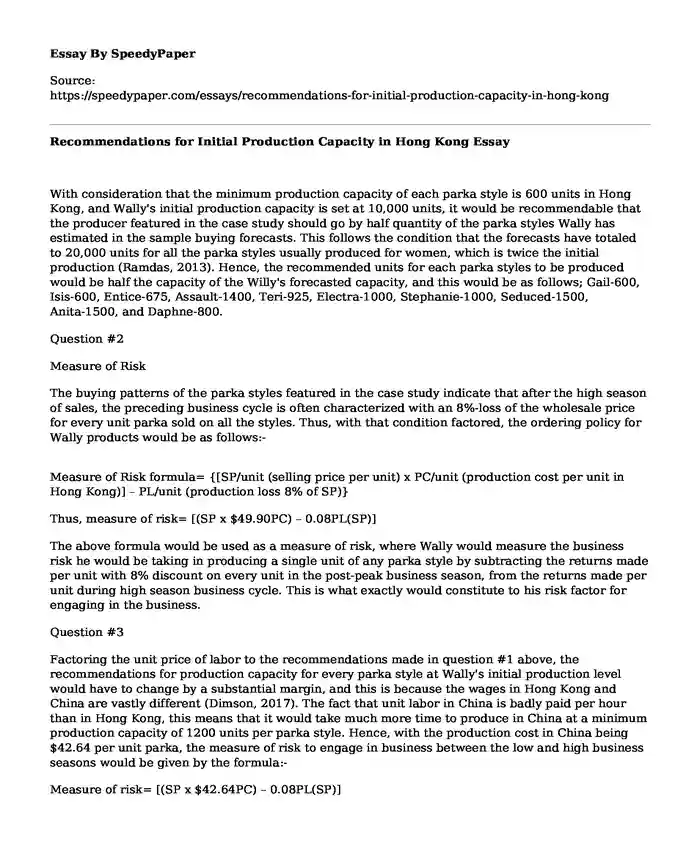
| Type of paper: | Case study |
| Categories: | Management Finance Society |
| Pages: | 3 |
| Wordcount: | 652 words |
With consideration that the minimum production capacity of each parka style is 600 units in Hong Kong, and Wally's initial production capacity is set at 10,000 units, it would be recommendable that the producer featured in the case study should go by half quantity of the parka styles Wally has estimated in the sample buying forecasts. This follows the condition that the forecasts have totaled to 20,000 units for all the parka styles usually produced for women, which is twice the initial production (Ramdas, 2013). Hence, the recommended units for each parka styles to be produced would be half the capacity of the Willy's forecasted capacity, and this would be as follows; Gail-600, Isis-600, Entice-675, Assault-1400, Teri-925, Electra-1000, Stephanie-1000, Seduced-1500, Anita-1500, and Daphne-800.
Question #2
Measure of Risk
The buying patterns of the parka styles featured in the case study indicate that after the high season of sales, the preceding business cycle is often characterized with an 8%-loss of the wholesale price for every unit parka sold on all the styles. Thus, with that condition factored, the ordering policy for Wally products would be as follows:-
Measure of Risk formula= {[SP/unit (selling price per unit) x PC/unit (production cost per unit in Hong Kong)] - PL/unit (production loss 8% of SP)}
Thus, measure of risk= [(SP x $49.90PC) - 0.08PL(SP)]
The above formula would be used as a measure of risk, where Wally would measure the business risk he would be taking in producing a single unit of any parka style by subtracting the returns made per unit with 8% discount on every unit in the post-peak business season, from the returns made per unit during high season business cycle. This is what exactly would constitute to his risk factor for engaging in the business.
Question #3
Factoring the unit price of labor to the recommendations made in question #1 above, the recommendations for production capacity for every parka style at Wally's initial production level would have to change by a substantial margin, and this is because the wages in Hong Kong and China are vastly different (Dimson, 2017). The fact that unit labor in China is badly paid per hour than in Hong Kong, this means that it would take much more time to produce in China at a minimum production capacity of 1200 units per parka style. Hence, with the production cost in China being $42.64 per unit parka, the measure of risk to engage in business between the low and high business seasons would be given by the formula:-
Measure of risk= [(SP x $42.64PC) - 0.08PL(SP)]
Hence, there is a great difference between the two production capacities in the two regions, and this is because producing it would give a lower business risk due to the cheap labor, while there is a greater risk in the other region due to higher wages awarded per unit labor.
Question #4
Based on a personal view, one would recommend that Wally should change the operational conditions by sharing the shipping charges with the foreign importers of the products so as to lessen the operational cost.
Question #5
For long-term, I would recommend that Wally uses China sourcing policy and this is because the minimum production levels are higher and the unit cost of production is lower. Also, labor is cheap in China than in Hong Kong (Konieczny, 2016). Hence, production capacity that needs bulky production for long-term use should be sourced to China. For the short-term production, Wally should use Hong Kong sourcing policy and this is because the laborers there have been deemed to be 50 times faster than in China and this is imperative for production of urgent produce needed in a short-term basis.
References
Dimson, E. (2017). Risk measurement when shares are subject to infrequent trading. Journal of Financial Economics, 7(2), 197-226.
Konieczny, J. D. (2016). Inflation, output and labour productivity when prices are changed infrequently. Economica, 201-218.
Ramdas, K. (2013). Managing product variety: An integrative review and research directions. Production and operations management, 12(1), 79-101.
Cite this page
Recommendations for Initial Production Capacity in Hong Kong. (2022, Dec 16). Retrieved from https://speedypaper.net/essays/recommendations-for-initial-production-capacity-in-hong-kong
Request Removal
If you are the original author of this essay and no longer wish to have it published on the SpeedyPaper website, please click below to request its removal:
- Free Essay about Unsaturated Oils in Human Diet
- Literary Essay Sample on Great Gatsby Research
- Comparison Essay Example on Decolonization Strategies and Re-indigenization
- Education Essay Example on Assessment Systems
- Free Essay on Why We Should Often Recycle
- Gap Inc. Company: Marketing Essay Example
- Music Essay Sample on Berlin School
Popular categories




